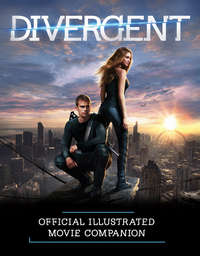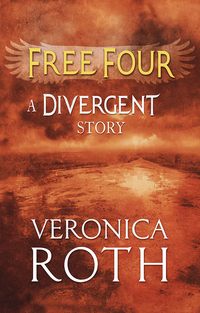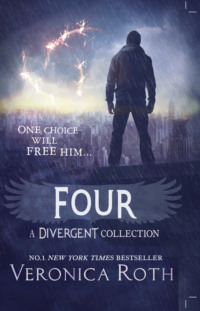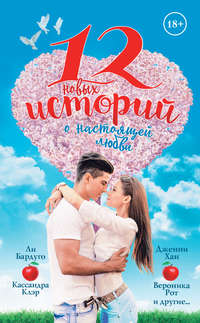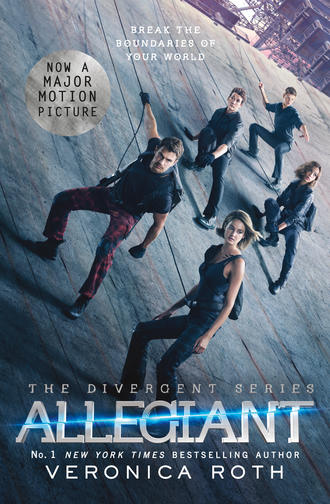
Полная версия
Allegiant
That gets his attention. He twists in his chair and stares at me, his eyes wild and wide, like prey faced with a predator.
“Is that a joke?”
“I’m really bad at telling jokes.”
“No.” He shakes his head. “No, I have a few weeks, it’s not tonight, no—”
“If you shut up, I’ll give you an hour to adjust to this new information. If you don’t shut up, I’ll knock you out and shoot you in the alley outside before you wake up. Make your choice now.”
Seeing an Erudite process something is like watching the inside of a watch, the gears all turning, shifting, adjusting, working together to form a particular function, which in this case is to make sense of his imminent demise.
Caleb’s eyes shift to the open door behind me, and he seizes the chair, turning and swinging it into my body. The legs hit me, hard, which slows me down just enough to let him slip by.
I follow him into the hallway, my arms burning from where the chair hit me. I am faster than he is—I slam into his back and he hits the floor face-first, without bracing himself. With my knee against his back, I pull his wrists together and squeeze them into a plastic loop. He groans, and when I pull him to his feet, his nose is bright with blood.
Drea’s eyes touch mine for just a moment, then move away.
I drag him down the hallway, not the way I came, but another way, toward an emergency exit. We walk down a flight of narrow stairs where the echo of our footsteps layers over itself, dissonant and hollow. Once I’m at the bottom, I knock on the exit door.
Zeke opens it, a stupid grin on his face.
“No trouble with the guard?”
“No.”
“I figured Drea would be easy to get by. She doesn’t care about anything.”
“It sounded like she had looked the other way before.”
“That doesn’t surprise me. Is this Prior?”
“In the flesh.”
“Why’s he bleeding?”
“Because he’s an idiot.”
Zeke offers me a black jacket with a factionless symbol stitched into the collar. “I didn’t know that idiocy caused people to just start spontaneously bleeding from the nose.”
I wrap the jacket around Caleb’s shoulders and fasten one of the buttons over his chest. He avoids my eyes.
“I think it’s a new phenomenon,” I say. “The alley’s clear?”
“Made sure of it.” Zeke holds out his gun, handle first. “Careful, it’s loaded. Now it would be great if you would hit me so I’m more convincing when I tell the factionless you stole it from me.”
“You want me to hit you?”
“Oh, like you’ve never wanted to. Just do it, Four.”
I do like to hit people—I like the explosion of power and energy, and the feeling that I am untouchable because I can hurt people. But I hate that part of myself, because it is the part of me that is the most broken.
Zeke braces himself and I curl my hand into a fist.
“Do it fast, you pansycake,” he says.
I decide to aim for the jaw, which is too strong to break but will still show a good bruise. I swing, hitting him right where I mean to. Zeke groans, clutching his face with both hands. Pain shoots up my arm, and I shake my hand out.
“Great.” Zeke spits at the side of the building. “Well, I guess that’s it.”
“Guess so.”
“I probably won’t be seeing you again, will I? I mean, I know the others might come back, but you . . .” He trails off, but picks up the thought again a moment later. “Just seems like you’ll be happy to leave it behind, that’s all.”
“Yeah, you’re probably right.” I look at my shoes. “You sure you won’t come?”
“Can’t. Shauna can’t wheel around where you guys are going, and it’s not like I’m gonna leave her, you know?” He touches his jaw, lightly, testing the skin. “Make sure Uri doesn’t drink too much, okay?”
“Yeah,” I say.
“No, I mean it,” he says, and his voice dips down the way it always does when he’s being serious, for once. “Promise you’ll look out for him?”
It’s always been clear to me, since I met them, that Zeke and Uriah were closer than most brothers. They lost their father when they were young, and I suspect Zeke began to walk the line between parent and sibling after that. I can’t imagine what it feels like for Zeke to watch him leave the city now, especially as broken by grief as Uriah is by Marlene’s death.
“I promise,” I say.
I know I should leave, but I have to stay in this moment for a little while, feeling its significance. Zeke was one of the first friends I made in Dauntless, after I survived initiation. Then he worked in the control room with me, watching the cameras and writing stupid programs that spelled out words on the screen or played guessing games with numbers. He never asked me for my real name, or why a first-ranked initiate ended up in security and instruction instead of leadership. He demanded nothing from me.
“Let’s just hug already,” he says.
Keeping one hand firm on Caleb’s arm, I wrap my free arm around Zeke, and he does the same.
When we break apart, I pull Caleb down the alley, and can’t resist calling back, “I’ll miss you.”
“You too, sweetie!”
He grins, and his teeth are white in the twilight. They are the last thing I see of him before I have to turn and set out at a trot for the train.
“You’re going somewhere,” says Caleb, between breaths. “You and some others.”
“Yeah.”
“Is my sister going?”
The question awakes inside me an animal rage that won’t be satisfied by sharp words or insults. It will only be satisfied by smacking his ear hard with the flat of my hand. He winces and hunches his shoulders, preparing for a second strike.
I wonder if that’s what I looked like when my father did it to me.
“She is not your sister,” I say. “You betrayed her. You tortured her. You took away the only family she had left. And because . . . what? Because you wanted to keep Jeanine’s secrets, wanted to stay in the city, safe and sound? You are a coward.”
“I am not a coward!” Caleb says. “I knew if—”
“Let’s go back to the arrangement where you keep your mouth closed.”
“Fine,” he says. “Where are you taking me, anyway? You can kill me just as well here, can’t you?”
I pause. A shape moves along the sidewalk behind us, slippery in my periphery. I twist and hold up my gun, but the shape disappears into the yawn of an alley.
I keep walking, pulling Caleb with me, listening for footsteps behind me. We scatter broken glass with our shoes. I watch the dark buildings and the street signs, dangling from their hinges like late-clinging leaves in autumn. Then I reach the station where we’ll catch the train, and lead Caleb up a flight of metal steps to the platform.
I see the train coming from a long way off, making its last journey through the city. Once, the trains were a force of nature to me, something that continued along their path regardless of what we did inside the city limits, something pulsing and alive and powerful. Now I have met the men and women who operate them, and some of that mystery is gone, but what they mean to me will never be gone—my first act as a Dauntless was to jump on one, and every day afterward they were the source of my freedom, they gave me the power to move within this world when I had once felt so trapped in the Abnegation sector, in the house that was a prison to me.
When it comes closer, I cut the tie around Caleb’s wrists with a pocketknife and keep a firm hold on his arm.
“You know how to do this, right?” I say. “Get in the last car.”
He unbuttons the jacket and drops it on the ground. “Yeah.”
Starting at one end of the platform, we run together along the worn boards, keeping pace with the open door. He doesn’t reach for the handle, so I push him toward it. He stumbles, then grabs it and pulls himself into the last car. I am running out of space—the platform is ending—I seize the handle and swing myself in, my muscles absorbing the pull forward.
Tris stands inside the car, wearing a small, crooked smile. Her black jacket is zipped up to her throat, framing her face in darkness. She grabs my collar and pulls me in for a kiss. As she pulls away, she says, “I always loved watching you do that.”
I grin.
“Is this what you had planned?” Caleb demands from behind me. “For her to be here when you kill me? That’s—”
“Kill him?” Tris asks me, not looking at her brother.
“Yeah, I let him think he was being taken to his execution,” I say, loud enough that he can hear. “You know, sort of like he did to you in Erudite headquarters.”
“I . . . it isn’t true?” His face, lit by the moon, is slack with shock. I notice that his shirt’s buttons are in the wrong buttonholes.
“No,” I say. “I just saved your life, actually.”
He starts to say something, and I interrupt him. “Might not want to thank me just yet. We’re taking you with us. Outside the fence.”
Outside the fence—the place he once tried so hard to avoid that he turned on his own sister. It seems a more fitting punishment than death, anyway. Death is so quick, so certain. Where we’re going now, nothing is certain.
He looks frightened, but not as frightened as I thought he would be. I feel like I understand, then, the way he ranks things in his mind: his life, first; his comfort in a world of his own making, second; and somewhere after that, the lives of the people he is supposed to love. He is the sort of despicable person who has no understanding of how despicable he is, and my badgering him with insults won’t change that; nothing will. Rather than angry, I just feel heavy, useless.
I don’t want to think about him anymore. I take Tris’s hand and lead her to the other side of the car, so we can watch the city disappear behind us. We stand side by side in the open doorway, each of us holding one of the handles. The buildings create a dark, jagged pattern on the sky.
“We were followed,” I say.
“We’ll be careful,” she answers.
“Where are the others?”
“In the first few cars,” she says. “I thought we should be alone. Or as alone as we can get.”
She smiles at me. These are our last moments in the city. Of course we should spend them alone.
“I’m really going to miss this place,” she says.
“Really?” I say. “My thoughts are more like, ‘Good riddance.’”
“There’s nothing you’ll miss? No good memories?” She elbows me.
“Fine.” I smile. “There are a few.”
“Any that don’t involve me?” she says. “That sounds self-centered. You know what I mean.”
“Sure, I guess,” I say, shrugging. “I mean, I got to have a different life in Dauntless, a different name. I got to be Four, thanks to my initiation instructor. He gave me the name.”
“Really?” She tilts her head. “Why haven’t I met him?”
“Because he’s dead. He was Divergent.” I shrug again, but I don’t feel casual about it. Amar was the first person who noticed that I was Divergent, and he helped me to hide it. But he couldn’t hide his own Divergence, and that killed him.
She touches my arm, lightly, but doesn’t say anything. I shift, uncomfortable.
“See?” I say. “Too many bad memories here. I’m ready to leave.”
I feel empty, not because of sadness, but because of relief, all the tension flowing out of me. Evelyn is in that city, and Marcus, and all the grief and nightmares and bad memories, and the factions that kept me trapped inside one version of myself. I squeeze Tris’s hand.
“Look,” I say, pointing at a distant cluster of buildings. “There’s the Abnegation sector.”
She smiles, but her eyes are glassy, like a dormant part of her is fighting its way out and spilling over. The train hisses over the rails, a tear drops down Tris’s cheek, and the city disappears into the darkness.
CHAPTER ELEVEN
TRIS
THE TRAIN SLOWS down when we get closer to the fence, a signal from the driver that we should get off soon. Tobias and I sit in the doorway of the car as it moves lazily over the tracks. He puts his arm around me and touches his nose to my hair, taking a breath. I look at him, at the collarbone peeking out from the neck of his T-shirt, at the faint curl of his lip, and I feel something heating up inside me.
“What are you thinking about?” he says into my ear, softly.
I jerk to attention. I look at him all the time, but not always like that—I feel like he just caught me doing something embarrassing. “Nothing! Why?”
“No reason.” He pulls me closer to his side, and I rest my head on his shoulder, taking deep breaths of the cool air. It still smells like summer, like grass baking in the heat of the sun.
“It looks like we’re getting close to the fence,” I say.
I can tell because the buildings are disappearing, leaving just fields, dotted with the rhythmic glow of lightning bugs. Behind me, Caleb sits near the other door, hugging his knees. His eyes find mine at just the wrong moment, and I want to scream into the darkest parts of him so he can finally hear me, finally understand what he did to me, but instead I just hold his stare until he can’t take it anymore and he looks away.
I stand, using the handle to steady me, and Tobias and Caleb do the same. At first Caleb tries to stand behind us, but Tobias pushes him forward, right up to the edge of the car.
“You first. On my mark!” he says. “And . . . go!”
He gives Caleb a push, just enough to get him off the car floor, and my brother disappears. Tobias goes next, leaving me alone in the train car.
It’s stupid to miss a thing when there are so many people to miss instead, but I miss this train already, and all the others that carried me through the city, my city, after I was brave enough to ride them. I brush my fingers over the car wall, just once, and then jump. The train is moving so slowly that I overcompensate with my landing, too used to running off the momentum, and I fall. The dry grass scrapes my palms and I push myself to my feet, searching the darkness for Tobias and Caleb.
Before I find them, I hear Christina. “Tris!”
She and Uriah come toward me. He is holding a flashlight, and he looks far more alert than he did this afternoon, which is a good sign. Behind them are more lights, more voices.
“Did your brother make it?” Uriah says.
“Yeah.” Finally I see Tobias, his hand gripping Caleb’s arm, coming toward us.
“Not sure why an Erudite like you can’t get it through his head,” Tobias is saying, “but you aren’t going to be able to outrun me.”
“He’s right,” says Uriah. “Four’s fast. Not as fast as me, but definitely faster than a Nose like you.”
Christina laughs. “A what?”
“Nose.” Uriah touches the side of his nose. “It’s a play on words. ‘Knows’ with a ‘K,’ knowledge, Erudite . . . get it? It’s like Stiff.”
“The Dauntless have the weirdest slang. Pansycake, Nose . . . is there a term for the Candor?”
“Of course.” Uriah grins. “Jerks.”
Christina shoves Uriah, hard, making him drop the flashlight. Tobias, laughing, leads us to the rest of the group, standing a few feet away. Tori waves her flashlight in the air to get everyone’s attention, then says, “All right, Johanna and the trucks will be about a ten-minute walk from here, so let’s get going. And if I hear a word from anyone, I will beat you senseless. We’re not out yet.”
We move closer together like sections of a tightened shoelace. Tori walks a few feet in front of us, and from the back, in the dark, she reminds me of Evelyn, her limbs lean and wiry, her shoulders back, so sure of herself it’s almost frightening. By the light of the flashlights I can just make out the tattoo of a hawk on the back of her neck, the first thing I spoke to her about when she administered my aptitude test. She told me it was a symbol of a fear she had overcome, a fear of the dark. I wonder if that fear still creeps up on her now, though she worked so hard to face it—I wonder if fears ever really go away, or if they just lose their power over us.
She moves farther away from us by the minute, her pace more like a jog than a walk. She is eager to leave, to escape this place where her brother was murdered and she rose to prominence only to be thwarted by a factionless woman who wasn’t supposed to be alive.
She is so far ahead that when the shots go off, I only see her flashlight fall, not her body.
“Split up!” Tobias’s voice roars over the sound of our cries, our chaos. “Run!”
I search in the dark for his hand, but I don’t find it. I grab the gun Uriah gave me before we left and hold it out from my body, ignoring the way my throat tightens at the feel of it. I can’t run into the night. I need light. I sprint in the direction of Tori’s body—of her fallen flashlight.
I hear but do not hear the gunshots, and the shouting, and the running footsteps. I hear but do not hear my heartbeat. I crouch next to the shaft of light she dropped and pick up the flashlight, intending to just grab it and keep running, but in its glow I see her face. It shines with sweat, and her eyes roll beneath her eyelids, like she is searching for something but is too tired to find it.
One of the bullets found her stomach, and the other found her chest. There is no way she will recover from this. I may be angry with her for fighting me in Jeanine’s laboratory, but she’s still Tori, the woman who guarded the secret of my Divergence. My throat tightens as I remember following her into the aptitude test room, my eyes on her hawk tattoo.
Her eyes shift in my direction and focus on me. Her eyebrows furrow, but she doesn’t speak.
I shift the flashlight into the crook of my thumb and reach for her hand to squeeze her sweaty fingers.
I hear someone approaching, and I aim flashlight and gun in the same direction. The beam hits a woman wearing a factionless armband, with a gun pointed at my head. I fire, clenching my teeth so hard they squeak.
The bullet hits the woman in the stomach and she screams, firing blindly into the night.
I look back down at Tori, and her eyes are closed, her body still. Pointing my flashlight at the ground, I sprint away from her and from the woman I just shot. My legs ache and my lungs burn. I don’t know where I’m going, if I’m running into danger or away from it, but I keep running as long as I can.
Finally I see a light in the distance. At first I think it’s another flashlight, but as I draw closer I realize it is larger and steadier than a flashlight—it’s a headlight. I hear an engine, and crouch in the tall grass to hide, switching my flashlight off and keeping my gun ready. The truck slows, and I hear a voice:
“Tori?”
It sounds like Christina. The truck is red and rusted, an Amity vehicle. I straighten, pointing the light at myself so she’ll see me. The truck stops a few feet ahead of me, and Christina leaps out of the passenger seat, throwing her arms around me. I replay it in my mind to make it real, Tori’s body falling, the factionless woman’s hands covering her stomach. It doesn’t work. It doesn’t feel real.
“Thank God,” Christina says. “Get in. We’re going to find Tori.”
“Tori’s dead,” I say plainly, and the word “dead” makes it real for me. I wipe tears from my cheeks with the heels of my hands and struggle to control my shuddering breaths. “I—I shot the woman who killed her.”
“What?” Johanna sounds frantic. She leans over from the driver’s seat. “What did you say?”
“Tori’s gone,” I say. “I saw it happen.”
Johanna’s expression is shrouded by her hair. She presses her next breath out.
“Well, let’s find the others, then.”
I get into the truck. The engine roars as Johanna presses the gas pedal, and we bump over the grass in search of the others.
“Did you see any of them?” I say.
“A few. Cara, Uriah.” Johanna shakes her head. “No one else.”
I wrap my hand around the door handle and squeeze. If I had tried harder to find Tobias . . . if I hadn’t stopped for Tori . . .
What if Tobias didn’t make it?
“I’m sure they’re all right,” Johanna says. “That boy of yours knows how to take care of himself.”
I nod, without conviction. Tobias can take care of himself, but in an attack, surviving is an accident. It doesn’t take skill to stand in a place where no bullets find you, or to fire into the dark and hit a man you didn’t see. It is all luck, or providence, depending on what you believe. And I don’t know—have never known—exactly what I believe.
He’s all right he’s all right he’s all right.
Tobias is all right.
My hands tremble, and Christina squeezes my knee. Johanna steers us toward the rendezvous point, where she saw Uriah and Cara. I watch the speedometer needle climb, then hold steady at seventy-five. We jostle one another in the cab, thrown this way and that way by the uneven ground.
“There!” Christina points. There is a cluster of lights ahead of us, some just pinpricks, like flashlights, and others round, like headlights.
We pull up close, and I see him. Tobias sits on the hood of the other truck, his arm soaked with blood. Cara stands in front of him with a first aid kit. Caleb and Peter sit on the grass a few feet away. Before Johanna has stopped the truck completely, I open the door and get out, running toward him. Tobias stands up, ignoring Cara’s orders to stay put, and we collide, his uninjured arm wrapping around my back and lifting me off my feet. His back is wet with sweat, and when he kisses me, he tastes like salt.
All the knots of tension inside me come apart at once. I feel, just for a moment, like I am remade, like I am brand-new.
He’s all right. We’re out of the city. He’s all right.
CHAPTER TWELVE
TOBIAS
MY ARM THROBS like a second heartbeat from the bullet graze. Tris’s knuckles brush mine as she lifts her hand to point at something on our right: a series of long, low buildings lit by blue emergency lamps.
“What are those?” Tris says.
“The other greenhouses,” Johanna says. “They don’t require much manpower, but we grow and raise things in large quantities there—animals, raw material for fabric, wheat, and so on.”
Their panes glow in the starlight, obscuring the treasures I imagine to be inside them, small plants with berries dangling from their branches, rows of potato plants buried in the earth.
“You don’t show them to visitors,” I say. “We never saw them.”
“Amity keeps a number of secrets,” Johanna says, and she sounds proud.
The road ahead of us is long and straight, marked with cracks and swollen patches. Alongside it are gnarled trees, broken lampposts, old power lines. Every so often, there is an isolated square of sidewalk with weeds forcing their way through the concrete, or a pile of rotting wood, a collapsed dwelling.
The more time I spend thinking about this landscape that every Dauntless patrol was told was normal, the more I see an old city rising up around me, the buildings lower than the ones we left behind, but just as numerous. An old city that was transformed into empty land for the Amity to farm. In other words, an old city that was razed, burned to cinders, and crushed into the ground, even the roads disappearing, the earth left to run wild over the wreckage.
I put my hand out the window, and the wind wraps around my fingers like locks of hair. When I was very young, my mother pretended she could shape things from the wind, and she would give them to me to use, like hammers and nails, or swords, or roller skates. It was a game we played in the evenings, on the front lawn, before Marcus got home. It took away our dread.
In the bed of the truck, behind us, are Caleb, Christina, and Uriah. Christina and Uriah sit close enough for their shoulders to touch, but they are looking in opposite directions, more like strangers than friends. Just behind us is another truck, driven by Robert, which carries Cara and Peter. Tori was supposed to be with them. The thought makes me feel hollow, empty. She administered my aptitude test. She made me think, for the first time, that I could leave Abnegation—that I had to. I feel like I owe her something, and she died before I could give it to her.



